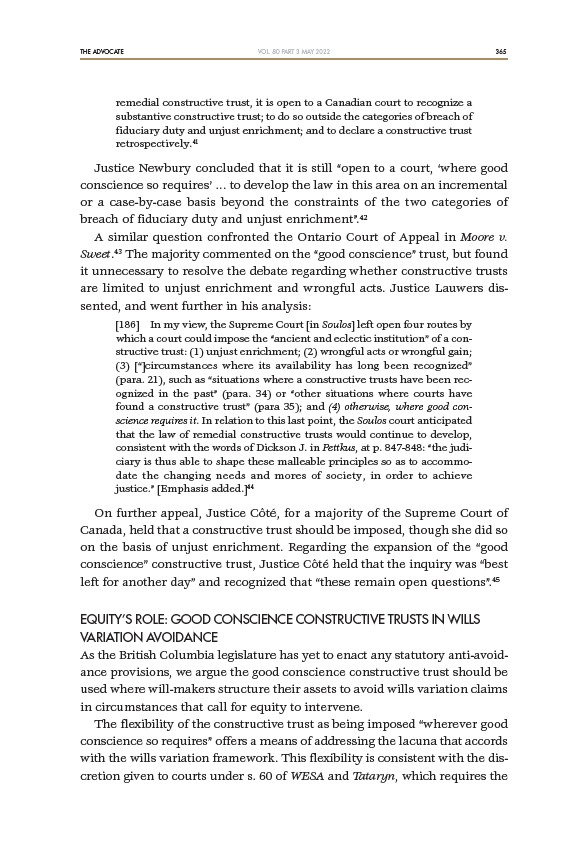
THE ADVOCATE 365
VOL. 80 PART 3 MAY 2022
remedial constructive trust, it is open to a Canadian court to recognize a
substantive constructive trust; to do so outside the categories of breach of
fiduciary duty and unjust enrichment; and to declare a constructive trust
retrospectively.41
Justice Newbury concluded that it is still “open to a court, ‘where good
conscience so requires’ … to develop the law in this area on an incremental
or a case-by-case basis beyond the constraints of the two categories of
breach of fiduciary duty and unjust enrichment”.42
A similar question confronted the Ontario Court of Appeal in Moore v.
Sweet.43 The majority commented on the “good conscience” trust, but found
it unnecessary to resolve the debate regarding whether constructive trusts
are limited to unjust enrichment and wrongful acts. Justice Lauwers dissented,
and went further in his analysis:
186 In my view, the Supreme Court in Soulos left open four routes by
which a court could impose the “ancient and eclectic institution” of a constructive
trust: (1) unjust enrichment; (2) wrongful acts or wrongful gain;
(3) “circumstances where its availability has long been recognized”
(para. 21), such as “situations where a constructive trusts have been recognized
in the past” (para. 34) or “other situations where courts have
found a constructive trust” (para 35); and (4) otherwise, where good conscience
requires it. In relation to this last point, the Soulos court anticipated
that the law of remedial constructive trusts would continue to develop,
consistent with the words of Dickson J. in Pettkus, at p. 847-848: “the judiciary
is thus able to shape these malleable principles so as to accommodate
the changing needs and mores of society, in order to achieve
justice.” Emphasis added.44
On further appeal, Justice Côté, for a majority of the Supreme Court of
Canada, held that a constructive trust should be imposed, though she did so
on the basis of unjust enrichment. Regarding the expansion of the “good
conscience” constructive trust, Justice Côté held that the inquiry was “best
left for another day” and recognized that “these remain open questions”.45
EQUITY’S ROLE: GOOD CONSCIENCE CONSTRUCTIVE TRUSTS IN WILLS
VARIATION AVOIDANCE
As the British Columbia legislature has yet to enact any statutory anti-avoidance
provisions, we argue the good conscience constructive trust should be
used where will-makers structure their assets to avoid wills variation claims
in circumstances that call for equity to intervene.
The flexibility of the constructive trust as being imposed “wherever good
conscience so requires” offers a means of addressing the lacuna that accords
with the wills variation framework. This flexibility is consistent with the discretion
given to courts under s. 60 of WESA and Tataryn, which requires the